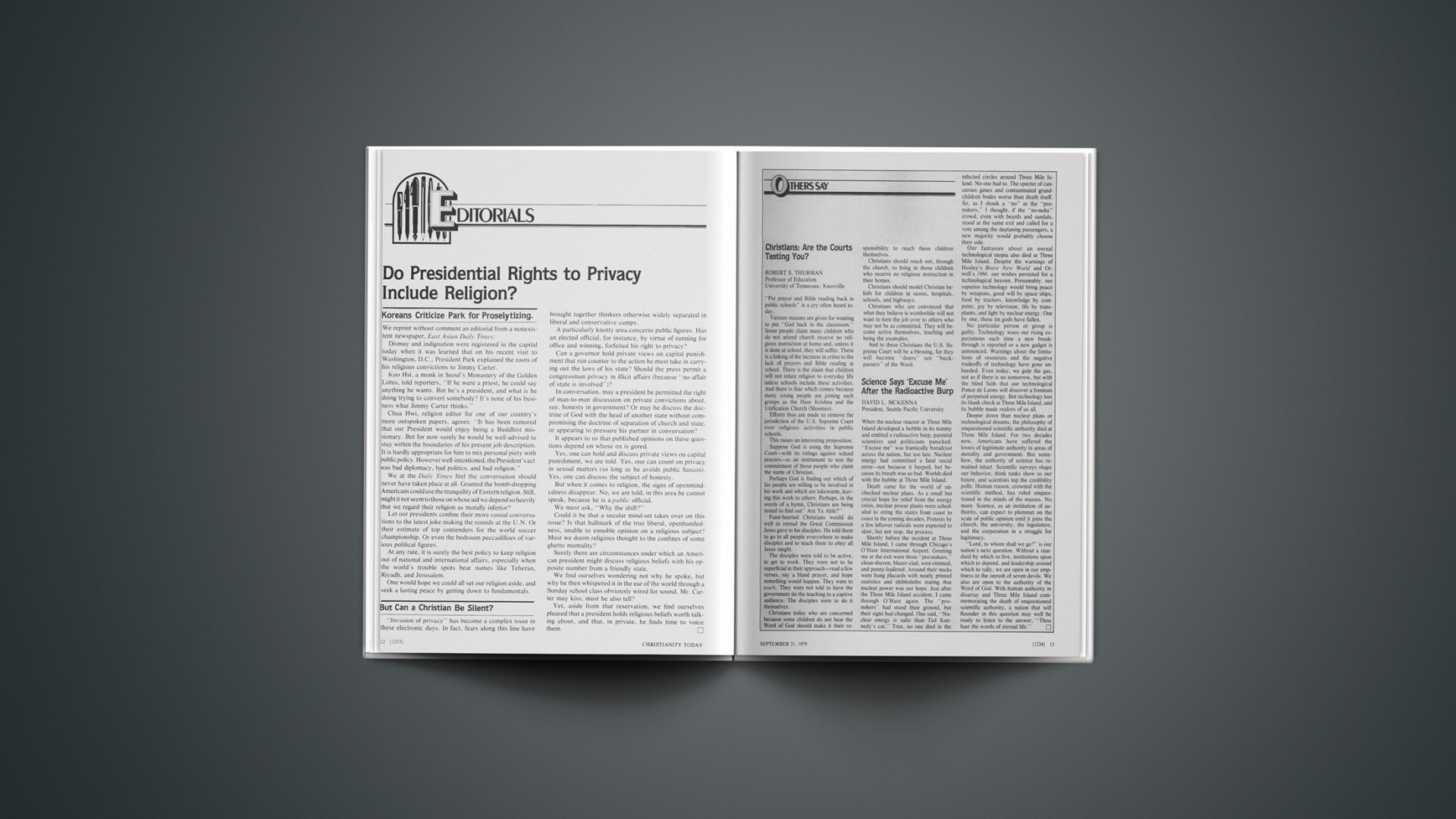Koreans Criticize Park For Proselytizing
We reprint without comment an editorial from a nonexistent newspaper, East Asian Daily Times:
Dismay and indignation were registered in the capital today when it was learned that on his recent visit to Washington, D.C., President Park explained the roots of his religious convictions to Jimmy Carter.
Kuo Hsi, a monk in Seoul’s Monastery of the Golden Lotus, told reporters, “If he were a priest, he could say anything he wants. But he’s a president, and what is he doing trying to convert somebody? It’s none of his business what Jimmy Carter thinks.”
Chua Hwi, religion editor for one of our country’s more outspoken papers, agrees: “It has been rumored that our President would enjoy being a Buddhist missionary. But for now surely he would be well-advised to stay within the boundaries of his present job description. It is hardly appropriate for him to mix personal piety with public policy. However well-intentioned, the President’s act was bad diplomacy, bad politics, and bad religion.”
We at the Daily Times feel the conversation should never have taken place at all. Granted the bomb-dropping Americans could use the tranquility of Eastern religion. Still, might it not seem to those on whose aid we depend so heavily that we regard their religion as morally inferior?
Let our presidents confine their more casual conversations to the latest joke making the rounds at the U.N. Or their estimate of top contenders for the world soccer championship. Or even the bedroom peccadilloes of various political figures.
At any rate, it is surely the best policy to keep religion out of national and international affairs, especially when the world’s trouble spots bear names like Teheran, Riyadh, and Jerusalem.
One would hope we could all set our religion aside, and seek a lasting peace by getting down to fundamentals.
But Can A Christian Be Silent?
“Invasion of privacy” has become a complex issue in these electronic days. In fact, fears along this line have brought together thinkers otherwise widely separated in liberal and conservative camps.
A particularly knotty area concerns public figures. Has an elected official, for instance, by virtue of running for office and winning, forfeited his right to privacy?
Can a governor hold private views on capital punishment that run counter to the action he must take in carrying out the laws of his state? Should the press permit a congressman privacy in illicit affairs (because “no affair of state is involved”)?
In conversation, may a president be permitted the right of man-to-man discussion on private convictions about, say, honesty in government? Or may he discuss the doctrine of God with the head of another state without compromising the doctrine of separation of church and state, or appearing to pressure his partner in conversation?
It appears to us that published opinions on these questions depend on whose ox is gored.
Yes, one can hold and discuss private views on capital punishment, we are told. Yes, one can count on privacy in sexual matters (so long as he avoids public fiascos). Yes, one can discuss the subject of honesty.
But when it comes to religion, the signs of openmindedness disappear. No, we are told, in this area he cannot speak, because he is a public official.
We must ask, “Why the shift?”
Could it be that a secular mind-set takes over on this issue? Is that hallmark of the true liberal, openhandedness, unable to ennoble opinion on a religious subject? Must we doom religious thought to the confines of some ghetto mentality?
Surely there are circumstances under which an American president might discuss religious beliefs with his opposite number from a friendly state.
We find ourselves wondering not why he spoke, but why he then whispered it in the ear of the world through a Sunday school class obviously wired for sound. Mr. Carter may kiss; must he also tell?
Yet, aside from that reservation, we find ourselves pleased that a president holds religious beliefs worth talking about, and that, in private, he finds time to voice them.










